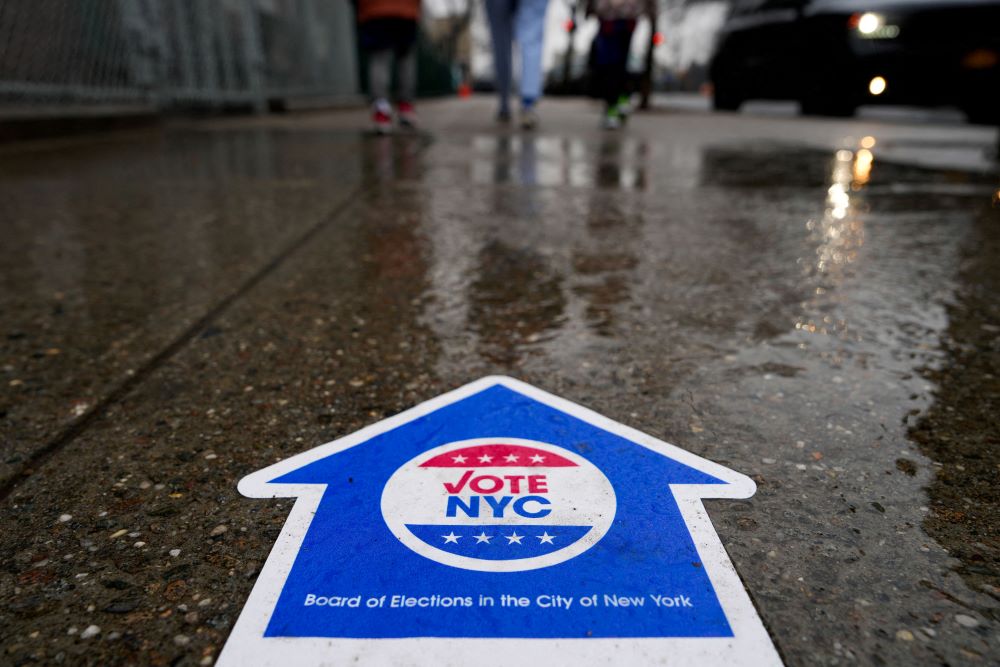
A sign directing people to vote in the New York Presidential Primary election is seen on the pavement in New York City April 2 (OSV News/Reuters/Adam Gray)
It's time for the Catholic bishops of the United States to begin regaining their lost credibility by taking a courageous stand for democracy before the 2024 election.
As former NCR editor Tom Roberts writes in the March 29 issue, "Here in the US, Catholicism is for sale." The bishops have ceded their teaching authority to a host of well-funded right-wing political groups who have embraced the "Catholic" brand to advance their economic and partisan goals.
"Mirroring the civic reality of the moment, extremists have taken over much of the public square in the name of Catholicism," Roberts writes. "They preach a crimped and narrow church, one that is retributive and rule-bound, willing to contort teachings and tradition in the interest of money and political power."
Let's take a step back. The bishops last fall again issued their quadrennial election guide, "Forming Consciences for Faithful Citizenship." The document closely follows those that have gone before, especially since the guide was last approved in 2015. Abortion remains the bishops "preeminent" concern, though this was not always the case in these documents. Democracy is mentioned once in the text, in passing.
To their credit, the bishops did place a new "Introductory Note" at the front of the guide for this election cycle. Up to a point, this note recognizes the polarization and nastiness of our political discourse.
"Increasingly, it seems, election seasons are a time of anxiety and spiritual trial. Political rhetoric is increasingly angry, seeking to motivate primarily through division and hatred," it states. "Fear can be an effective tool for raising money."
They do not, however, attempt to trace this toxicity back to its main sources and write as though the fault falls equally on all sides. "While the bishops help form the laity in accordance with basic principles, they do not tell the laity to vote for particular candidates," they remind us.
The note says it is the laity's responsibility to learn about Catholic teaching and tradition, to participate in church life, to learn "from trustworthy sources about the issues, and to do our best to make wise judgments about candidates and government actions."
The only pointed reference to democracy in the entire document is at the conclusion of the note: "May God bless our nation with true wisdom, peace, and mutual forgiveness, that we may decide together, through our democratic processes, to uphold the dignity of life and the common good."
Compared to the misinformation about Catholicism flying around, "Forming Consciences for Faithful Citizenship" is a strong document based on actual church teaching. This despite its embrace of a culture-war approach rather than following Pope Francis' lead toward a "field hospital" church based on missionary discipleship.
Advertisement
Calling abortion "preeminent" in the statement is not required by Rome. Nuclear war, which could easily outpace abortion in the number of deaths of innocents, hardly gets a mention. Given both Pope Francis' emphasis on it and the havoc it is wreaking across the country, climate change should have gotten much more emphasis as a threat to life.
Yet, the document is strong on the dignity of immigrants and refugees and the need for comprehensive immigration reform. In addition, both the note and the guide quote Pope Francis frequently, and the bishops often speak in noble and lofty terms refreshing in these times.
But there is a huge weakness in the document: It takes democracy and the rule of law in our country as granted and inevitable. It's time for the U.S. Conference of Catholic Bishops to issue a supplementary note to their guide, addressing the existential threat facing our system of government.
Drawing on church teaching about democracy, here's a proposed text:
Dear Brothers and Sisters:
This is a critical time in the life of the United States of America. Much is at stake in the upcoming general election in November. Before issuing this special supplementary note, we have carefully gathered and evaluated information from individuals and media from across the political spectrum.
We write convinced that democracy, the rule of law and commitment to truth are under severe threat in our land. Let us recall the words of St. Pope John Paul II in his 1991 encyclical Centesimus annus:
"The Church values the democratic system inasmuch as it ensures the participation of citizens in making political choices, guarantees to the governed the possibility both of electing and holding accountable those who govern them, and of replacing them through peaceful means when appropriate. Thus she cannot encourage the formation of narrow ruling groups which usurp the power of the State for individual interests or for ideological ends."
Now, we are seeing the rise of a movement that wants to short-circuit democracy to get its desired result. On Jan. 6, 2021, we saw for the first time in U.S. history a violent attempt to overturn a free and fair election.
The same movement is laying the groundwork for a repeat this year. Their message is: "If we lose, the system is rigged." When we approved our current voter guide in 2015, threats against and harassment of election officials in our country were virtually unheard of. Now, they have become widespread.
We also note that, in an unacceptable attack on our religious freedom as Catholics, official church organizations working to assist migrants across our southern border are facing similar threats and harassment. This, too, is unacceptable.
Where once church teaching found ethical relativism mainly in movements of the political left, this malady has migrated across the aisle and is now endemic on the political right. In this incarnation, whatever the leader does or says, no matter how morally outrageous, is right. Dissenters are ostracized — or worse.
To quote the "Compendium of the Social Doctrine of the Church," "Among the deformities of the democratic system, political corruption is one of the most serious because it betrays at one and the same time both moral principles and the norms of social justice."
We make no apology for our desire to protect life from conception to natural death and to defend marriage. These issues remain at the top of our agenda.
Yet, we can no longer ignore the moral rot threatening to undermine our 248-year-old national experiment. Once democracy is lost, our ability to chart our course toward a more just and loving society also will be lost, perhaps forever.
We can do better. Fear, scapegoating and intimidation will never build a "culture of life." Retribution, hate and calumny will not create a "civilization of truth and love." Will we — who have benefitted so much from freedom, democracy and the rule of law — hand off to future generations an autocracy of cynicism and fear?
Respectfully,
The United States Conference of Catholic Bishops
Will the bishops issue a statement like this before the general election? It's almost certain that they won't. Yet, if they did it would be good for their independence and moral stature — and for our democracy.





